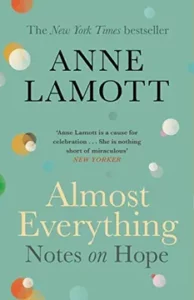 I am stockpiling antibiotics for the apocalypse, even as I await the blossoming of paperwhites on the windowsill in the kitchen. The news of late has captured the fever dream of modern life: everything exploding, burning, being shot, or crashing to the ground all around us, while growing older has provided me with a measure of perspective and equilibrium, and a lovely long-term romance. Towns and cities, ice fields, democracy, people – all disappear, while we rejoice and thrive in the spring and the sweetness of old friendships. Families are tricky. There is so much going on that flattens us, that is huge, scary or simply appalling. We’re doomed, stunned, exhausted, and overcaffeinated.
I am stockpiling antibiotics for the apocalypse, even as I await the blossoming of paperwhites on the windowsill in the kitchen. The news of late has captured the fever dream of modern life: everything exploding, burning, being shot, or crashing to the ground all around us, while growing older has provided me with a measure of perspective and equilibrium, and a lovely long-term romance. Towns and cities, ice fields, democracy, people – all disappear, while we rejoice and thrive in the spring and the sweetness of old friendships. Families are tricky. There is so much going on that flattens us, that is huge, scary or simply appalling. We’re doomed, stunned, exhausted, and overcaffeinated.
And yet, outside my window, yellow roses bloom, and little kids horse around, making a joyous racket.
Last time we visited Beechworth, we went to the honey shop and browsed the jars of single varietal honey. I chose Snow Gum (delicious; I’d had it before), and as an experiment, Buckwheat, which sounded kind of toasty and wholesome.
I asked the woman at the counter what it tasted like. A slight hesitation.
‘Great with blue cheese,’ she said, and then another woman chimed in with,
‘Divisive.’ When we got home and tried it, it tasted very much like horse manure smells. Which brings me around neatly to Ann Lamott and Almost Everything.
I’m not suggesting this book is horseshit. Just divisive. I know for a certainty that some of my friends and family would find her mixture of memoir, platitudes, parables, anecdotes and God-and-Jesus intolerably middle-brow. Or simply intolerable.
So, yes, there is God, and Jesus in both of these books, but it’s pretty restrained. Not fundamentalist, not dogmatic, preachy or churchy. Not even especially Christian. You could substitute Buddha for much of what she’s saying, and it wouldn’t change the essential meaning. We all need to give and receive kindness and forgiveness. A little humility goes a long way. Listening is good, as is not leaping quickly to judge others.
You can find this stuff served up on the spirituality and/or self-help shelves of bookshops everywhere, but there are two things that make Lamott different. One is the humour – she’s smart, funny, snarky and genuinely laugh-out-loud funny – and the other is the ruthless self-exposure, also known as ‘honesty’.
Now…honesty. Along with its twin, ‘authenticity’, it’s a much used and abused term. Is the real Ann Lamott on the page? How could I know? But her willingness to roll over and expose her ugly, broken, petty, vain, despairing, craving and pitiful underside in her books seems pretty honest to me. At her lowest, she was famous, celebrated, successful, the author of the beloved writing classic Bird by Bird, broke, cripplingly anxious, drunk every day and had developed an eating disorder. Not pretty. But, she says, ‘Almost every facet of my meager maturation and spiritual understanding has sprung from hurt, loss and disaster’. She got sober and found faith, in tandem.
Lamott turned 70 last year, and published her 20th book. I’ve read maybe 5 or 6 of them, and when I try to think about them, they all blend together. I wonder if her lifetime ‘theme and variations’ – as in a piece of music – is simply ‘living with paradox’. You know – we’re ugly and beautiful; life is meaningless and meaningful; other people are both intolerable and wonderful. I can write, right this minute, echoing Lamott, that the news is dire with Neo-Nazis, cop-killing pseudo-legal nutjobs, children and babies starving in Gaza. I’ve hurt my neck, one of our friends is dying of cancer – actually, we’re all going to die. And outside my window, the japonica is in flower and little birds are building nests.
Almost everyone is screwed up, broken, clingy, scared and yet designed for joy.

Sending hugs, Sue.
And to you, Kate. Life, eh? Did we know about any of this when we were young? No, and wouldn’t have listened if any one told us. xxx